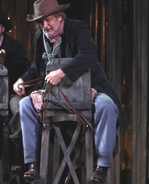SITE GUIDE
SEARCH
REVIEWS
REVIEW ARCHIVES
ADVERTISING AT CURTAINUP
FEATURES
NEWS
Etcetera and
Short Term Listings
LISTINGS
Broadway
Off-Broadway
NYC Restaurants
BOOKS and CDs
OTHER PLACES
Berkshires
London
California
New Jersey
DC
Connecticut
Philadelphia
Elsewhere
QUOTES
TKTS
PLAYWRIGHTS' ALBUMS
LETTERS TO EDITOR
FILM
LINKS
MISCELLANEOUS
Free Updates
Masthead
A CurtainUp Review
White Woman Street
|
So thirty years ago not far from here I saw the worst sight of all my days and I hit the roads of America as a simple outlaw and followed that trade. . .So now with memories of home I aim to head for home again and rest a local man in Sligo. But I can't go till peace is made, till I stand again in
White Woman Street, and beg a certain ghost for her good word. —Trooper O'Hara
|

Stephen Payne as Trooper O'Hara in White Woman Street
(Photo: Carol Rosegg) |
Once an Indian fighter, O'Hara's plan now is to attack a train carrying gold as it passes through the town of White Woman Street. It is what happened in this town 30 years ago that has tormented Trooper and what brings tension and anticipation to Sebastian Barry's White Woman Street at the Irish Reparatory Theater.
The time is Easter in 1916 Ohio. Trooper tells his men about the town of White Woman Street, regaling them with tales of its popular brothel with the Indian prostitutes and one famous white prostitute. "That sweat-drenched, withered girl was more perfect than first love.". When one of the gang comments, "Hate to rob a nice town like that" Trooper responds "Not robbin' it. That train in't the possession of that town. That a through-going train, Blakely. We can be moral men there in that town, believe me."
In 95 minutes including intermission, Irish playwright, novelist and poet Barry, uses rich language to portray an emotional portrait of a man, his roots, and his demons. He gives Trooper and the other displaced miscreants voices for their stories, breaking the tales up with laughter, songs, dancing and a grand feast when they shoot a wild boar. Barry tends to keep his focus on the past and the American and Irish folklore and history comes through vibrantly.
Director Charlotte Moore draws distinctive performances from the ensemble, bringing out the colors of each character. Stephen Payne plays Trooper with restraint and simmering intensity, his voice strong and resonant. After the robbery, he plans to return to his Irish hometown of Sligo, where youthful memories of his family and the land play in his mind and where he plans to finally rest. Trooper is obviously not aware of the current Easter uprising of 1916 in Ireland.
Evan Zes portrays naive Nathanial Yeshov, a Russian/Chinese émigré from Brooklyn. He questions why Trooper, an ex-soldier, never shot an Indian. Says Trooper, "Ever see an Indian town? Put me in mind of certain Sligo hills, and certain men in certain Sligo Hills. The English had done for us, I was thinking, and now we're doing for the Indians. . .unless you been to war you don't."
An English exile, Blakely, played by Greg Mullavey, is in his 50's, expansive with a ready laugh, quick temper and harboring resentment toward Trooper. Charlie Hudson III plays the youngest, James (Jim) Miranda, an African-American who fled Tennessee to escape the violence there. He now makes coffee for the band and eagerly waits to take his gold and live in a real city. The eldest is a 70-year old exiled Amish, Mo Mason (Gordon Stanley), who senses the turmoil within Trooper and eventually earns his trust. Later in the story, Clarke (Ron Crawford), a Native American, appears as a brothel worker and through him, the story of Trooper's torment begins to emerge.
Hugh Landwehr's set is simple and brilliantly effective in gray with campsite bed blankets and assorted paraphernalia strewn over the floor. David Toser's costumes are likewise drab and ragged. Dark posts line two sides of the stage like trees, with Clifton Taylor's lighting design shadowing them like the hours of the day. Most interesting are the horses— five stools with high backs facing front. The men mount the stools, yahooing and flashing their whips, with Zachary Williamson's sound effects of hoof beats.
White Woman Street is a tight, word-driven sketch of history that brings rough eloquence to the depth, humor, and torment of Trooper and his disparate followers while balancing the Irish tradition of extended storytelling, deviltry, and heroism.
|
Book by Sebastian Barry Directed by Charlotte Moore Cast: Charlie Hudson, III, Greg Mullavey, Stephen Payne, Gordan Stanley, Evan Zes Set Design: Hugh Landwehr Lighting Design: Clifton Taylor Costume Design: David Toser Sound Design: Zachary Williamson Props: Deirdre Brennan Casting: Deborah Brown Running Time: 95 minutes including intermission Irish Repertory Theatre: 132 West 22nd Street. 212-727-2737 Tickets: $55.00 - $65.00 Performances: Wednesday - Saturday at 8pm, Sat. and Sun. at 3pm. Previews: 5/07/10. Opening 5/16/10. Closing 6/27/10. Review by Elizabeth Ahlfors based on performance 5/13/10 |
|
REVIEW FEEDBACK Highlight one of the responses below and click "copy" or"CTRL+C"
Paste the highlighted text into the subject line (CTRL+ V): Feel free to add detailed comments in the body of the email. . .also the names and emails of any friends to whom you'd like us to forward a copy of this review. You can also contact us at Curtainup at Facebook , Curtainup at Twitter and at our Blog Annex |
|
Subscribe to our FREE email updates with a note from editor Elyse Sommer about additions to the website -- with main page hot links to the latest features posted at our numerous locations. To subscribe,
E-mail: esommer@curtainup.comesommer@curtainup.com
put SUBSCRIBE CURTAINUP EMAIL UPDATE in the subject line and your full name and email address in the body of the message -- if you can spare a minute, tell us how you came to CurtainUp and from what part of the country. |





